Posted on March 15, 2017 by The Orwell Prize -
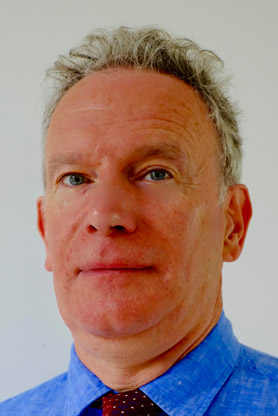
Submitted Articles
Posted on March 15, 2017 by The Orwell Prize -
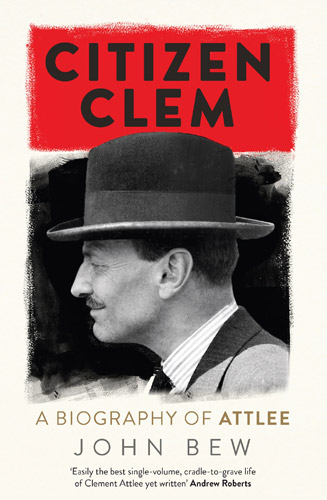
The story of Attlee is also much more dramatic than he himself ever made out – and not without an element of heroism. Here was a man born in the governing class who devoted his life to the service of the poor; who was carried off the battlefield three times in the First World War; who stood shoulder to shoulder with Churchill at Britain’s darkest moment, and then triumphed over him at the general election of 1945. His government of 1945-51 included Ernest Bevin, Herbert Morrison and Nye Bevan and was the most radical in history, giving us the NHS, National Insurance, NATO and the atomic bomb. In many ways we still live in a world of Attlee’s creation. This book will pierce the reticence of Attlee and explore the intellectual foundations and core beliefs of one of the most important figures in twentieth-century British history, arguing that he remains underappreciated, rather than simply underestimated. It will reveal a public servant and patriotic socialist, who never lost sight of the national interest and whose view of humanity and belief in solidarity was grafted onto the Union Jack.
Taken from Quercus
Posted on March 7, 2016 by The Orwell Prize -

In 1985 Mikhail Gorbachev launched Perestroika, opened Russia up to the world, ended the Cold War and gave his people freedom. The demise of the Soviet Union offered hope that Russia would become a ‘normal’, ‘civilized’ country, embracing Western values of democracy and the free market. Thirty years later, Russia emerged as a corporate state, overcome by imperial nationalism, fanned by its authoritarian president Vladimir Putin, who smashed the post-Cold War order and ignited a war on the borders of Europe. How did a country that liberated itself from seventy years of Soviet rule end up as one of the biggest threats to the West and, above all, to its own future? Why did the people who rejected Communist ideology come to accept state propaganda? In this bold and important book, Arkady Ostrovsky takes the reader on an enthralling journey from Gorbachev’s freedom to Putin’s war, illuminating the key turning points that often took the world by surprise.
The main characters are not politicians, however, but those who took charge of the media and the message and invented Russia’s dominant narrative. From the suddenly wealthy men who came to command the airwaves to the newspaper editors and TV directors, and from the Russian intelligentsia to the Kremlin spin doctors and ideologists, The Invention of Russia shows just how these figures shaped the country during the tumultuous post-Soviet transformation. As a foreign correspondent in his own country, Ostrovsky has experienced Russia’s modern history first-hand, and through original research and interviews he reveals the ideological conflicts, compromises and temptations that have left Russia on a knife-edge.
Taken from and read more at Atlantic Books.
Posted on March 2, 2016 by The Orwell Prize -

Iona Craig is a freelance journalist. In 2015, she was recognized for her work as a Yemen correspondent at The Times of London, for which she was the recipient of the 2014 Martha Gellhorn prize.
@ionacraig
Submitted Articles
Posted on March 2, 2016 by The Orwell Prize -
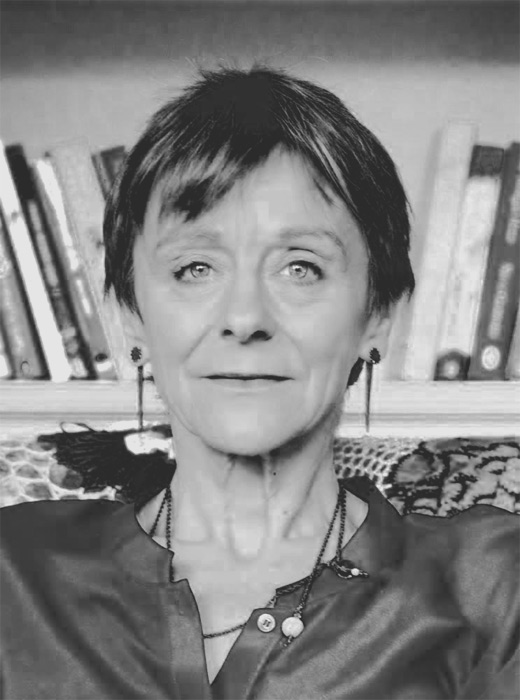
Nicci Gerrard is a novelist and author of Soham: A Story Of Our Times. She also writes with her partner Sean French as Nicci French. With nearly one million Britons in the grip of dementia, it’s hardly surprising that writers and artists should increasingly tackle the subject. But can the arts ever illuminate a condition that by its very nature resists all understanding?
@FrenchNicci
Submitted articles
Posted on March 2, 2016 by The Orwell Prize -

Gideon Rachman became chief foreign affairs columnist for the Financial Times in July 2006. He joined the FT after a 15-year career at The Economist, which included spells as a foreign correspondent in Brussels, Washington and Bangkok. He also edited The Economist’s business and Asia sections. His particular interests include American foreign policy, the European Union and globalisation.
@gideonrachman
Submitted Articles
Posted on April 24, 2015 by The Orwell Prize -

Alison has a long track record of reporting on the realities of life for some of the most vulnerable people in our society, using her detailed knowledge of social care to expose a system that is under pressure. In Undercover Elderly Care: Behind Closed Doors, a Panorama special broadcast in BBC1 prime time, Alison worked with producer Joe Plomin, undercover reporter Alex Lee and assistant producer Ceri Isfryn to put together a powerful programme showing the human cost of poor care. The programme led to a parliamentary debate, widespread national media coverage and the sacking of seven staff at an Essex care home. Social care experts say the programme helped shape the Care Quality Commission’s new inspection regime and describe it as ground-breaking for the way in which it charts the impact on individuals of day to day poor care. This is the third Panorama film on care that Alison has made with producer Joe Plomin in the past three years. The Hospital that Stopped Caring (October 2012) looked at the system failures that allowed abuse at Winterbourne View Hospital for people with learning disabilities and autism to go unchecked. Elderly Care: Condition Critical (June 2013) looked at increases in deaths in homes where poor care was suspected. All three of these films got extremely high audience appreciation ratings. In addition to reporting on what Behind Closed Doors uncovered for all main BBC radio and television news outlets, Alison continued to follow the different strands of the story for the BBC’s flagship TV news programmes at Six and Ten. Three care workers have since been arrested and charged at the Essex home and at another home, Orchid View, a serious case review spelt out the failings that had led to the deaths of some elderly residents. In the last year, Alison has also reported on the pressures faced by home care staff and the failure to move people with learning disabilities closer home. The stories included in this entry are just a selection of a wide range of stories Alison has done on the care of the elderly and vulnerable in the last year, among them reports on the impact of loneliness and worries over social care funding. It shows a continuing determination to ensure the voices of some of the most marginalised in society are heard.
Video
Audio
- Diary of a home care worker – BBC Radio 4, “PM”, 12/1/2014
- Essex care home sackings – BBC Radio 4, six o’clock news, 4/30/2014
Posted on March 25, 2015 by The Orwell Prize -

Since 2005, Martin Chulov has been reporting for The Guardian from the Middle East, covering crises across the Arab world.
Articles submitted
Posted on March 25, 2015 by The Orwell Prize -

In a little over a generation the bones and sinews of the British economy – rail, energy, water, postal services, municipal housing – have been sold to remote, unaccountable private owners, often from overseas. In a series of brilliant portraits the award-winning novelist and journalist James Meek shows how Britain’s common wealth became private, and the impact it has had on us all: from the growing shortage of housing to spiralling energy bills.
Meek explores the human stories behind the incremental privatization of the nation over the last three decades. He shows how, as our national assets are sold, ordinary citizens are handed over to private tax-gatherers, and the greatest burden of taxes shifts to the poorest. In the end, it is not only public enterprises that have become private property, but we ourselves.
Urgent, powerfully written and deeply moving, this is a passionate anatomy of the state of the nation: of what we have lost and what losing it cost us – the rent we must pay to exist on this private island.
Taken from Verso
An extract from Private Island is available here: Sale of the century: the privatisation scam
Posted on May 21, 2014 by The Orwell Prize -

Jonathan Freedland is a columnist at the Guardian. He also regularly writes for the New York Review of Books and the Jewish Chronicle. He also presents ‘The Long View’ on Radio 4, and writes novels under the pseudonym Sam Bourne. He was shortlisted for the Orwell Prize for journalism in 2007.
Submitted Articles
Posted on May 21, 2014 by The Orwell Prize -
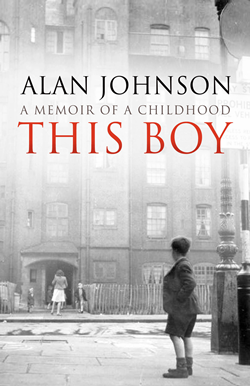
Alan Johnson’s childhood was not so much difficult as unusual, particularly for a man who was destined to become Home Secretary. Not in respect of the poverty, which was shared with many of those living in the slums of post-war Britain, but in its transition from two-parent family to single mother and then to no parents at all…
This is essentially the story of two incredible women: Alan’s mother, Lily, who battled against poor health, poverty, domestic violence and loneliness to try to ensure a better life for her children; and his sister, Linda, who had to assume an enormous amount of responsibility at a very young age and who fought to keep the family together and out of care when she herself was still only a child.
Played out against the background of a vanishing community living in condemned housing, the story moves from post-war austerity in pre-gentrified Notting Hill, through the race riots, school on the Kings Road, Chelsea in the Swinging 60s, to the rock-and-roll years, making a record in Denmark Street and becoming a husband and father whilst still in his teens.
This Boy is one man’s story, but it is also a story of England and the West London slums which are so hard to imagine in the capital today. No matter how harsh the details, Alan Johnson writes with a spirit of generous acceptance, of humour and openness which makes his book anything but a grim catalogue of miseries.
Taken from Penguin.
Posted on May 21, 2014 by The Orwell Prize -

Ghaith Abdul-Ahad is an Iraqi journalist, who has reported from Iraq, Afghanistan, Syria, and Libya. He is a Guardian foreign correspondent, and writes regularly for the London Review of Books.
@GhaithAbdulahad
Articles submitted
Posted on May 16, 2013 by The Orwell Prize -
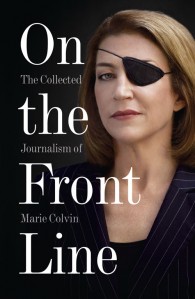
A fearless, passionate veteran reporter of conflicts from around the world, Sunday Times journalist Marie Colvin was killed in February 2012, covering the uprising in Syria from the besieged city of Homs. On the Front Line is a collection of her finest work, a portion of the proceeds from which will go to the Marie Colvin Memorial Fund.
Marie Colvin held a profound belief in the pursuit of truth, and the courage and humanity of her work was deeply admired. On the Front Line includes her various interviews with Yasser Arafat and Colonel Gadaffi; reports from East Timor in 1999 where she shamed the UN into protecting its refugees; accounts of her terrifying escape from the Russian army in Chechnya; and reports from the strongholds of the Sri Lankan Tamil Tigers where she was hit by shrapnel, leaving her blind in one eye.
Typically, however, her new eye-patch only reinforced Colvin’s sense of humour and selfless conviction. She returned quickly to the front line, reporting on 9/11, Afghanistan, Iraq, Gaza and, lately, the Arab Spring.
Immediate and compelling, On the Front Line is a street-view of the historic events that have shaped the last 25 years, from an award-winning foreign correspondent and the outstanding journalist of her generation.
Taken from HarperCollins
Posted on March 20, 2013 by The Orwell Prize -
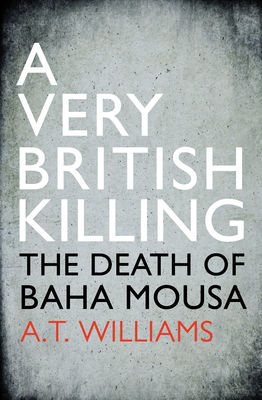
On 15 September 2003 Baha Mousa, a hotel receptionist, was killed by British Army troops in Iraq. He had been arrested the previous day in Basra and was taken to a military base for questioning. For forty-eight hours he and nine other innocent civilians had their heads encased in sandbags and their wrists bound by plastic handcuffs and had been kicked and punched with sustained cruelty.
A succession of guards and casual army visitors took pleasure in beating the Iraqis, humiliating them, forcing them into stress positions in temperatures up to 50 degrees Centigrade, and watching them suffer in the dirty concrete building where they were held. Other soldiers, officers, medics, the padre, did not take part in the violence but they saw what was happening and did nothing to stop it. Some knew it was wrong. Some weren’t sure. Some were too scared to intervene. But none said anything or enough until it was far too late and Baha Mousa had been beaten to death.
This book tells the inside story of these crimes and their aftermath. It examines the institutional brutality, the bureaucratic apathy, the flawed military police inquiry and the farcical court martial that attempted to hold people criminally responsible. Even though a full public inquiry reported its findings into the crimes in September 2011, its mandate restricted what it could say. The full story, told with the power of a true-crime expose or court-room drama, shows how this was not simply about a few bad men or ‘rotten apples’. It shines a light on all those involved in the crime and its investigation, from the lowest squaddie to the elite of the army and politicians in Cabinet. What it reveals is devastating.
Taken from Random House
Posted on March 20, 2013 by The Orwell Prize -

Tom Bergin is a Reuters journalist who writes about corporate and economic affairs. He is also the author of ‘Spills & Spin: The Inside Story of BP’, a critically-acclaimed history of the British oil major. In March 2013, he was named “Business Journalist of the Year” at the British Press Awards and has also won a Society of American Business Editors and Writers award for explanatory reporting. Tom is a regular contributor on television and radio in the UK and overseas.
Submitted articles
Posted on March 20, 2013 by The Orwell Prize -

Andrew Norfolk is The Times journalist instrumental in breaking the Rotherham grooming scandal. He recently won the Paul Foot Award for investigative journalism.
Submitted articles
Other links
Posted on May 23, 2012 by The Orwell Prize -

Christopher Hitchens was memorialised for his passionate contribution to political writing. In the name of the Prize, Peter Hitchens, himself an Orwell winner, presented a Memorial to Carol Blue, Christopher’s widow. Christopher Hitchens, the writer and commentator once described as the heir to Orwell, died last year at the age of 62. His final book Arguably was longlisted for this year’s prize and his memoir Hitch-22 was shortlisted for the 2011 Orwell Prize for Books. His books, journalism and more recently blogs have shaped political writing and thinking for a generation.
We are especially delighted to welcome Christopher Hitchens’ family and children to the Prize. Ian McEwan wrote of Hitchens that, “His unworldly fluency never deserted him, his commitment was passionate, and he never deserted his trade. He was the consummate writer.” Hitchens carried Orwell’s ambition “to make political writing into an art” forward and made it his own: he crafted a literate politics that helped form a world view.
Jean Seaton
Director of The Orwell Prize
Posted on February 28, 2012 by The Orwell Prize -

Bringing you the story that Scottish journalists seem unable to do. Taken from Rangers Tax-Case
Submitted posts
- What is Rangers’ tax case all about? – Rangers Tax Case, 28/03/11
- Lies, damned lies, and Scottish football journalism – Rangers Tax Case, 29/03/11
- The Other Rangers Tax Case – Rangers Tax Case, 01/04/11
- Alastair Johnston Confirms The RangersTaxCase Truth – Rangers Tax Case, 02/04/11
- Rangers’ Expert Advice – Rangers Tax Case, 04/04/11
- Rangers Knew About Other Tax Bill – Rangers Tax Case, 06/04/11
- Making sense of nonsense – Rangers Tax Case, 26/04/11
- The deceptive Craig Whyte – Rangers Tax Case, 25/05/11
- Credit Where Credit Is Due – Rangers Tax Case, 14/08/11
- Martin Bain, His lawyers, Rangers & Insolvency – Rangers Tax Case, 10/09/11

















